Chuseok in South Korea | Mid-Autumn Festival Explained
Chuseok // A Traditional Korean Festival
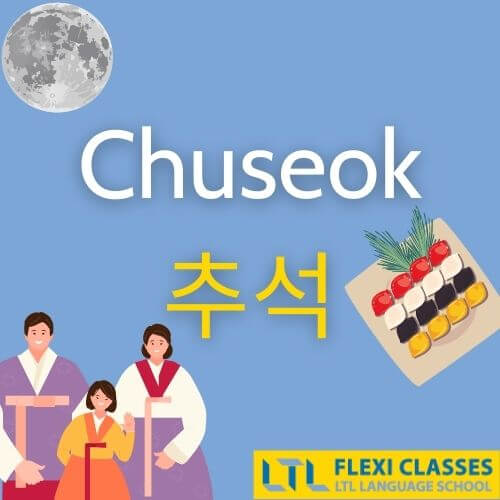
Today we’re going to introduce you to Chuseok 추석, or as people like to call it – Korean Thanksgiving.
Chuseok, along with Seollal (설날), is one of the biggest traditional holidays in South Korea.
This day is celebrated to mark the mid-autumn period and to honour the moon, the harvest, but also the ancestors.
This is why it is also known as the harvest and full moon festival.
It is a holiday with a number different names which are:
- 추석 Chuseok
- 한가위 Hangawi
- 중추절 Jungchujeol
- 가배 Gabae
Moreover, like Seollal, Chuseok is a lunar festival, so the date of this event changes every year according to the lunar calendar
Chuseok in South Korea:
September 17th 2024
October 6th 2025
September 25th 2026
Here is what we will cover in this article, feel free to skip to the part that interests you the most:
Chuseok | The Origins of Chuseok
Chuseok | What do People do During Chuseok?
Chuseok | Korean Dishes
Chuseok | When is Chuseok Celebrated?
Chuseok | Vocabulary
Chuseok | FAQ’s
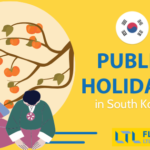
An Introduction to Public Holidays in South Korea
There are 11 public holidays in South Korea. Chuseok, Seollal, Children’s Day… Find out what these days are all about and celebrate with friends.
The Origins of Chuseok
The origins of Chuseok are still uncertain, but this festival would have been born more than a thousand years ago.
It’s assumed that it started before the Three Kingdoms period because it already existed in the Shilla Dynasty.
The king would have organised festivities and among the offered activities there was a weaving contest named Gabae (가배). At the end of the contest, the losing team would have to cook a full banquet for the winners.
Other historians suggest that the origins of Chuseok come from ancient Korean shamanic rites, practiced at the full moon in favour of the harvest…
In any case, Chuseok affirms Korea’s connection with its agricultural tradition, as it is still today an expression of gratitude and an important moment to spend with the family.
In fact, the Mid Autumn Festival isn’t just celebrated in South Korea, but other countries throughout Asia as well.
Check out our guide to discover how Mid Autumn Festival is celebrated in China.
What do People do During Chuseok?
Chuseok is a holiday that Korean people spend with their families. This day is celebrated with good food and gifts (Spam, fruit baskets, meat sets etc).
FACT | Highways are often congested during Chuseok. Train, bus and plane tickets are sold well in advance. It’s a good idea to plan ahead if you wish to be in Korea during this holiday.
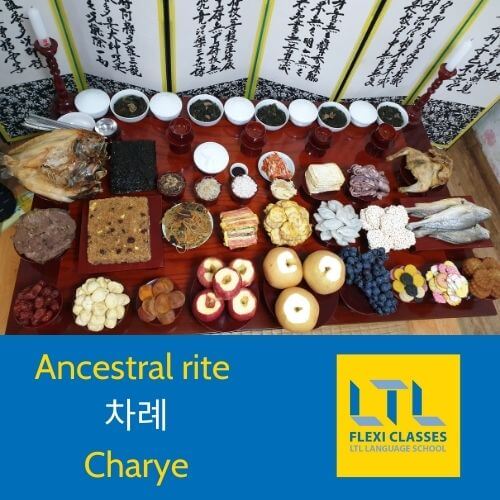
Koreans honour the memory of their ancestors during Chuseok.
Thus, there are many rituals which are called “Jesa” (제사).
The most common of these ancestral rites is the “Charye” (차례), the setting of the table to offer the meal to the deceased. Similarly, at the end of the meal, the ancestors are honoured with two deep bows followed by a lighter one called “keunjeol” (큰절).
Chuseok remains above all a festival with its share of amusements and customs.
Many traditional games, mainly practised in the agricultural field, are organised. Ssireum (씨름) and ganggangsulae (강강술래) are the most popular.
강강술래 Ganggangsulae
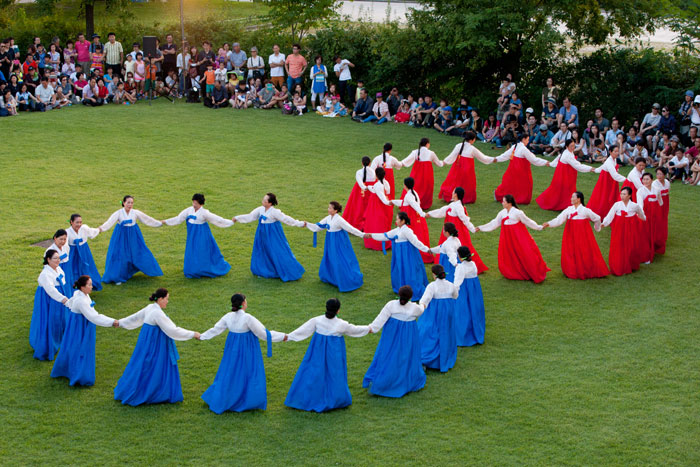
Women dance in a circle in traditional dress. They all sing while dancing.
In connection with the full moon, this dance represents femininity and fertility. The women express their gratitude to the sky for the harvests.
씨름 Ssireum
Traditional Korean wrestling performances take place on a sand ring.
During the fight, the opponents grab each other by the belt and fight shoulder to shoulder until one of them is thrown to the ground.
You may well have already seen this in Korean variety shows.

Squid Game Cultural References // Hidden Meanings and Symbolism
If you haven’t watched this show yet: why?? Find out about Squid Game cultural references in characters’ names, episodes’ titles, games and more!
Typical Korean Dishes
All Koreans will tell you, during Chuseok, we eat… a lot!
It is of course the occasion to highlight many Korean specialities, including Songpyeon (송편), Jeon (전), and Japchae (잡채).
- Songpyeon 송편 : An essential part of the Chuseok table, songpyeon are colourful rice cakes steamed on pine needles. They can be filled with chestnuts, red bean paste, honey or sesame seeds.
- Jeon 전 : Korean pancakes are one of the most popular side dishes. They can be prepared with meat, seafood, vegetables or mushrooms.
- Japchae 잡채 : This side dish is often served at traditional Korean festivals. Japchae consists of sweet potato noodles mixed with vegetables and meat (usually beef) marinated in soy sauce and sesame oil.
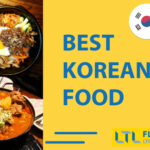
The Best Korean Food 🇰🇷 The Top 10 Korean Dishes for New Eaters to Try Out
There’s LOTS of various dishes in the Korean gastronomy. It might be hard to know what to try out first, so we selected the best Korean food for you to try.
When is Chuseok Celebrated?
It is celebrated precisely on the fifteenth day of the eighth month of the lunar calendar, during the largest full moon of the year.
Like many other public days based on the lunar calendar, its date changes every year.
In 1989, South Korea decided to grant three holiday days for Chuseok, including the day before and the day after.
This way, everyone can make the journey to their hometown and reunite with their families.
| Years | Date | Days | Holiday |
|---|---|---|---|
| 2024 | 16 to 18 September | Monday to Wednesday | Chuseok |
| 2025 | 5 to 8 October | Sunday to Wednesday | Chuseok |
| 2026 | 24 to 26 September | Thursday to Saturday | Chuseok |
Korean Vocabulary to Know
| English | Korean | Transliteration |
|---|---|---|
| Chuseok | 추석 | chuseok |
| Public holiday | 공휴일 | gonghyuil |
| Family | 가족 | gajog |
| Hanbok | 한복 | hanbok |
| Food | 음식 | eumsig |
| Songpyeon | 송편 | songpyeon |
| Japchae | 잡채 | japchae |
| Jeon | 전 | jeon |
| Galbijjim | 갈비찜 | galbijjim |
| Gifts | 선물 | seonmul |
| Moon | 달 | dal |
| Ancestor memorial services | 차례 | charye |
| Ancestral grave maintenance | 벌초 | beolcho |
| Ancestral rites | 제사 | Jesa |
| Ganggangsulae Dance | 강강술래 | ganggangsulae |
| Ssireum | 씨름 | ssireum |
| Theatrical presentations | 사물놀이 | Samulnori |
| Mask dance | 탈춤 | talchum |
| Traditional games | 전통놀이 | jeontongnoli |
| Bull fighting | 소싸움 | sossaum |
| Gabae | 가배 | gabae |
| Have a good Chuseok | 추석 잘 보내세요 | chuseok jal bonaeseyo |
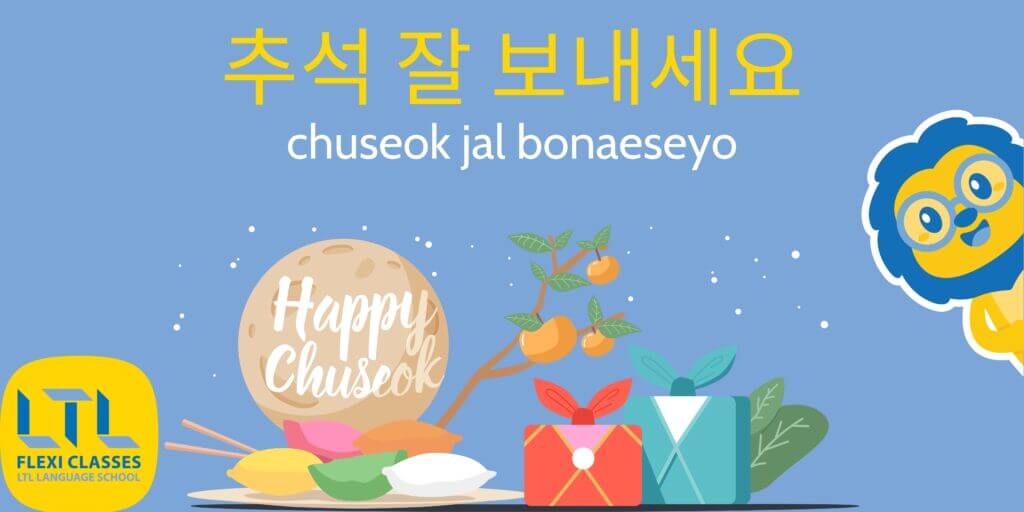
추석 잘 보내세요 (chuseok jal bonaeseyo) Have a good Chuseok!
If you are interested in Korean culture and you would like to know more about Korean holidays, you can check out our articles or page:
- Hangul Day
- Buddha’s Birthday
- Chilseok
- An introduction to Korean holidays
- Full list of Korean National Holidays
FAQ’s
When is Chuseok celebrated?
Chuseok is celebrated precisely on the fifteenth day of the eighth month of the lunar calendar, during the largest full moon of the year.
Like many other public days based on the lunar calendar, its date changes every year.
When is Chuseok celebrated in 2024?
In 2024, Chuseok is celebrated from September 16th to 18th.
When is Chuseok celebrated in 2025?
In 2025, Chuseok is celebrated from October 5th to 8th.
What do Koreans do during Chuseok?
Koreans honour the memory of their ancestors.
There are many rituals, called “Jesa” (제사).
The most common of these ancestral rites is the “Charye” (차례), the setting of the table to offer the meal to the deceased. Similarly, at the end of the meal, the ancestors are honoured with two deep bows followed by a lighter one called “keunjeol” (큰절).
This day remains above all a festival with its share of amusements and customs.
Many traditional games, mainly practised in the agricultural field, are organised. Ssireum (씨름) and ganggangsulae (강강술래) are the most popular.
What do people eat during Chuseok?
In general Koreans eat Songpyeon (송편), Jeon (전), and Japchae (잡채).
How to write Chuseok in Korean?
Chuseok in hangul is 추석
Are there any other Korean holidays to know about?
To know more about other Korean holidays check out this page about other Korean holidays.
Want More From LTL?
FANCY LEARNING KOREAN? Check out our online Korean courses here.
We offer a 7-day free trial to all online students where you can study Korean 24/7.
Want to study Korean in Korea instead? Our Korean courses in Seoul can either be taken in small groups of no more than 5 students or individually for a more tailored experience.
We even offer incredible homestay experiences in Seoul too.
To top it all off, it certainly doesn’t end with Korean. Check out the other languages we teach 👇🏻








